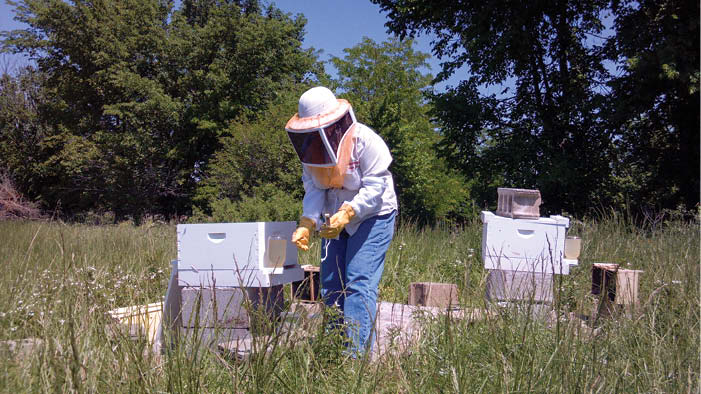By Dale Castle
Northeast News
June 3, 2015
The sun was shinning and the temperature was a pleasant sixty one degrees that afternoon when I parked my truck at a local business. It was late January but so usually warm that I decided to leave my window open while I went inside for a few minutes.
As I walked back to my truck I could vaguely see some thing flying around inside the cab.
Once I got close enough I realized what it was. Bees! Honey bees to be exact. Perhaps twenty or twenty five of them inspecting the interior of my pickup. Now what, I thought?
I suddenly remember the words of my former Northeast high school classmate and bee keeper, Debbie Buck. “Don’t freak out when honey bees are around you.” she said. “Just gently brush them off you or move around them slowly.” I swallowed hard and opened the door. I pushed the power window button to open the passenger window and slowly slid into the driver’s seat. I took off my ball cap and very gently pushed the bees towards the open windows. Within a couple of minutes the truck was bee free and my heart rate was once again normal.
After graduating in 1969, Debbie moved to Nevada where she lived until buying a farm in Eldorado Springs, Mo in 1990. It wasn’t long before she started raising cows, horses, flowers and vegetables. A friend at work who also had a farm raised bees to earn extra money. Debbie had been interested in keeping bees for some time so she joined a local bee club five years ago, bought three hives and started asking her coworker lots of questions about caring for honey bees. “I didn’t really get in it to make money,” Debbie explained. “I like to eat honey and I knew that bees are in serious trouble because of all the insecticides farmers use. I wanted to help them anyway I could.”
Another theory for their declining numbers is that a lot of big commercial bee keepers haul their bees to California to pollinate pistachios and almond trees. Experts think this is harmful to the bees system since they aren’t getting a large variety of foods instead of just one kind.
Bees are extremely important to the world. It’s often been said that they are responsible for one out of every three bites of food we eat. Without their help in pollinating crops we would all starve to death.
Bees start shutting down in August because most of the flowers and vegetables are dying which leaves very little food for them to eat. As the days grow shorter and winter approaches the workers ball up around the queen in the center of the hive to keep her warm. When temperatures occasionally reach the sixties in January and February it will sometimes trick them into thinking spring is here. They will break from the ball and start walking around the hive and fly outside. Night comes and the temperatures drop causing the bees to freeze to death.
Fortunately, most hives make it through winter. Debbie always faces her hives to the southeast so they can get the warm morning sun. Worker bees start their search for food at first light and return to the hive just before dark. There are very few flowers blooming in early spring so the bees fly as far as six miles from the hive to feast on buds from Oak, Redbud, Honey Locust and Bradford trees. Debbie helps them out by providing sugar water. She has three established hives and has started two new ones. A strong, healthy hive can contain as many as 60,000 bees.
I asked Debbie what it means when bees swarm. “That’s when a hive gets too crowded.” she said. “The workers will feed a royal jelly to the new queen and she will leave with a large group of the workers to start a new hive.”
Not only is winter a problem for honey bees but various other pests can make life difficult for the hive. Beetles, mites and wax moths will prey on a weak hive if they get a chance. Debbie works the hives once a week using various methods that fight these parasites. She harvests the honey once a year making sure she leaves approximately sixty pound for the bees to eat during the winter. The bees wax from the combs will be saved and used for many things.
While most hives are in rural areas there are quite a few located in the city. There are local bee clubs that can give you information on how to set up your own hive. If you don’t feel comfortable with a working hive in your yard you can help bees in other ways.
Planting fall blooming flowers is a great idea because food is scarce then. Cantaloupe, watermelons, pumpkins have huge blooms loaded with pollen. Just about any kind of flowers will certainly help. Don’t use pesticides in your yard. If it gets on a bee they can take it back to the hive where it can completely destroy it. I spray a combination of vegetable oil and dish soap on my gardens which does a pretty good job of getting rid of unwanted insects. If you should happen to get stung, take the stinger out at once to keep venom from continuing to go into your system.
If we work together perhaps we can help build the declining numbers of Missouri’s state insect back to where they need to be.



















